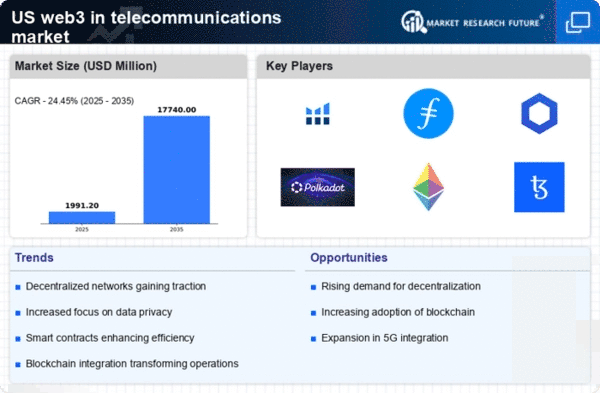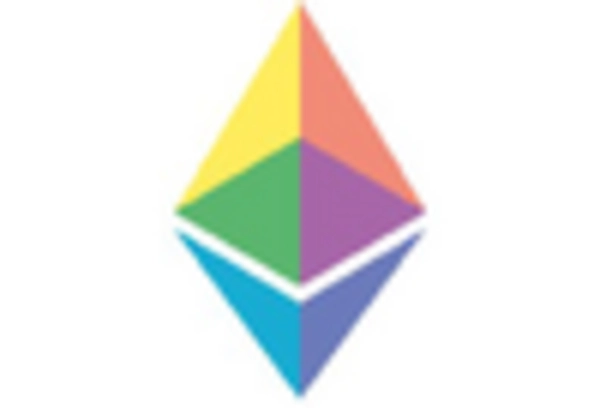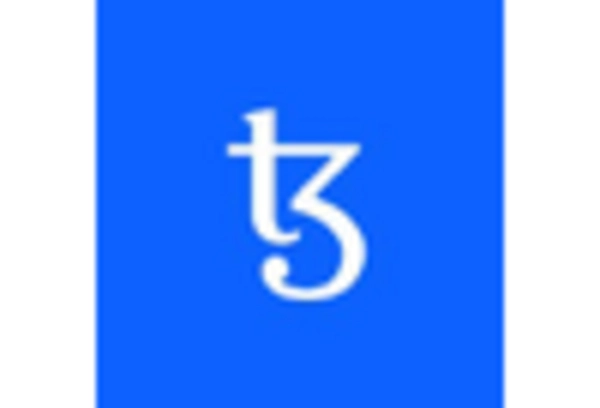Rise of Edge Computing
The increasing reliance on edge computing is a notable driver in the web3 in-telecommunications market. This technology allows data processing to occur closer to the source, reducing latency and improving service delivery. As of November 2025, the edge computing market is projected to reach $15 billion in the US, with telecommunications being a key sector benefiting from this trend. By enabling real-time data processing and analytics, edge computing enhances the performance of telecommunications services, particularly in applications such as IoT and 5G. The web3 in-telecommunications market is likely to see a surge in demand for edge computing solutions, as companies strive to provide faster and more reliable services to their customers.
Adoption of Smart Contracts
The integration of smart contracts is emerging as a transformative driver in the web3 in-telecommunications market. These self-executing contracts, built on blockchain technology, facilitate automated transactions and agreements without the need for intermediaries. As of November 2025, the adoption rate of smart contracts in telecommunications is estimated to be around 30%, with projections indicating further growth as companies recognize their potential to streamline operations. By automating processes such as billing and service provisioning, smart contracts can significantly reduce operational costs and enhance efficiency. This trend is likely to reshape the web3 in-telecommunications market, as service providers leverage smart contracts to offer innovative solutions that meet evolving customer demands.
Increased Demand for Privacy Solutions
Growing concerns regarding data privacy and security are driving demand for privacy-centric solutions within the web3 in-telecommunications market. Consumers are increasingly aware of how their data is utilized, leading to a shift towards services that prioritize user privacy. Recent surveys indicate that approximately 70% of users express a preference for telecommunications services that offer enhanced privacy features. This trend is prompting companies to adopt blockchain-based solutions that ensure data integrity and confidentiality. As a result, The market is witnessing a transformation as providers invest in technologies that safeguard user information. This focus on privacy not only enhances customer trust but also positions companies favorably in a competitive landscape where data protection is paramount.
Emergence of Decentralized Applications
The rise of decentralized applications (dApps) is a pivotal driver in the market. These applications leverage blockchain technology to provide enhanced functionality and user control. As of November 2025, the number of dApps has surged, with estimates suggesting over 10,000 active dApps across various sectors, including telecommunications. This proliferation indicates a shift towards user-centric models, where individuals have greater autonomy over their data and interactions. The market is likely to benefit from this trend as service providers integrate dApps into their offerings. This will enhance customer engagement and satisfaction. Furthermore, the potential for reduced operational costs through decentralized infrastructure may attract more players to the market, fostering innovation and competition.
Investment in Blockchain Infrastructure
Investment in blockchain infrastructure is a critical driver shaping the web3 in-telecommunications market. As companies recognize the potential of blockchain to enhance transparency and security, funding for blockchain projects has surged. In 2025, investments in blockchain technology within the telecommunications sector are estimated to exceed $5 billion in the US. This influx of capital is facilitating the development of innovative solutions that address challenges such as fraud prevention and network security. The web3 in-telecommunications market is poised for growth as companies leverage blockchain infrastructure to create more resilient and efficient systems. This trend not only fosters technological advancement but also encourages collaboration among industry players, further driving market evolution.
















